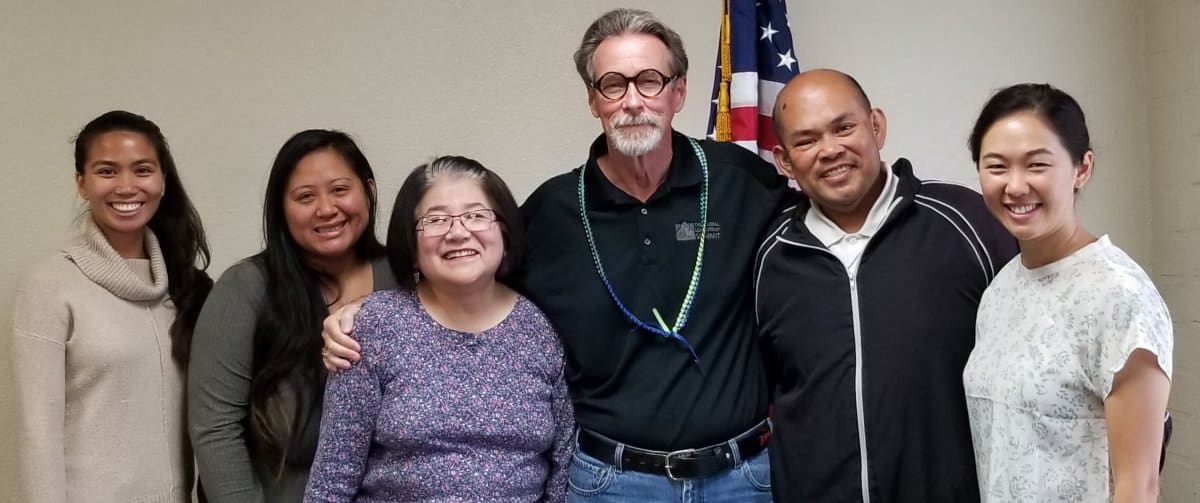
Last month, Dr. John Harrison, CADCA’s Special Assistant to the CEO, took a trip to Los Angeles, California. While there, he had the opportunity to meet with the Asian American Drug Abuse Program, Inc., (AADAP) coalition. He shares his insights into the work this group is doing within their community:
In early March, just a few weeks before public gatherings and businesses across the country were shut down, I traveled to Los Angeles to participate in the 2020 Los Angeles Marathon. One of my goals during this trip was to visit a Los Angeles community substance use and misuse prevention coalition to get an up-close view of their work to improve the safety, health and well-being of their community. Fortunately, the AADAP coalition, located in the Crenshaw area of Los Angeles, is a long-time member of CADCA and welcomed my visit.
I was fortunate to first encounter the coalition as exhibitors at a racing event held the day before the LA Marathon. The coalition was sharing their mission and work with participants and attendees at the “LA Big 5-K Race” held at Dodger Stadium on Saturday, March 7th. I’m a big believer in serendipity, and from the first moment of meeting the coalition’s development director, Paulina Hong, I could tell that their motto “people need people” was a beacon that guides their work. My visit three days later confirmed that impression.
Dr. Mike Watanabe, President & CEO of AADAP, Inc., and I found a special connection in our past lives. Mike was a U.S. Army helicopter crew chief/combat door gunner stationed in Vietnam in 1970 operating out of the same area of South Vietnam during the time I was serving with a U.S. Army Signal Battalion there. After reflecting back 50 years to our youth and experiences, he was gracious enough to explain his own nearly 45 years of working in the counseling and substance use and misuse field, as well as the diverse mission he oversees.
Paulina gave me a tour of the coalition while explaining its work within the community. In addition to primary substance use and misuse prevention, the coalition uses their facility for classes on resume preparation, preparing for job interviews and as an election polling station, among other purposes.
When we arrived at the “team prevention” office, I met the wonderful group of individuals you see in the group photo above (left to right, Tiffany Tan, Community Organizer (tobacco cessation focus); Jessica Abaya, Community Organizer; Carol Almeda, Community Organizer (community advocacy); myself; Richard Bis, Community Organizer (alcohol and underage drinking); and Paulina Hong, director of coalition development.)
The Crenshaw district, a neighborhood in South Los Angeles where the coalition focuses its work, has people of every walk of life and background that need and benefit from the work of this energized and conscientious team. During our chat, I gained several insights into their goals and approach to serving the community.
The coalition’s focus is alcohol, tobacco, prescription drugs and marijuana, and their prevention goals include increasing capacity for positive change, creating spaces for native voices and concerns and enlarging their footprint of effectiveness across the continuum of prevention, treatment and recovery. Contending with “legal yet lethal” substances that flourish in their community, including alcohol and marijuana, poses special challenges. Carol Almeda stated that in her advocacy work she embraces the paradigm of environmental prevention, based on her belief that change comes from the outside, as the result of concerted efforts by people in all sectors of the community. She commented that “We do our best to meet them at their level of need.”
Richard Bis, in sharing his extensive work in alcohol cessation and underage drinking prevention with surrounding merchants and the City of Carson Sheriff’s Department, affirmed the effectiveness of “people to people” communication and creating respectful relationships with everyone concerned. Tiffany Tan was insightful and enthused about her work in tobacco cessation across several communities in the coalition footprint. Electronic cigarettes, JUULing and underage use of these new nicotine sources are other examples of the need to take a “service forward” outlook to substance use and misuse prevention.
It was a pleasure to meet this committed group of professionals and learn from them. The coalition involves individuals of different ages and years of prevention experience, coming together to achieve the same goals. My beloved “City of Angels” and the Crenshaw district are fortunate to have these folks working each day to improve the lives of their fellow neighbors—”person to person.”
My sincere thanks to everyone at Team AADAP for their time and hospitality.



